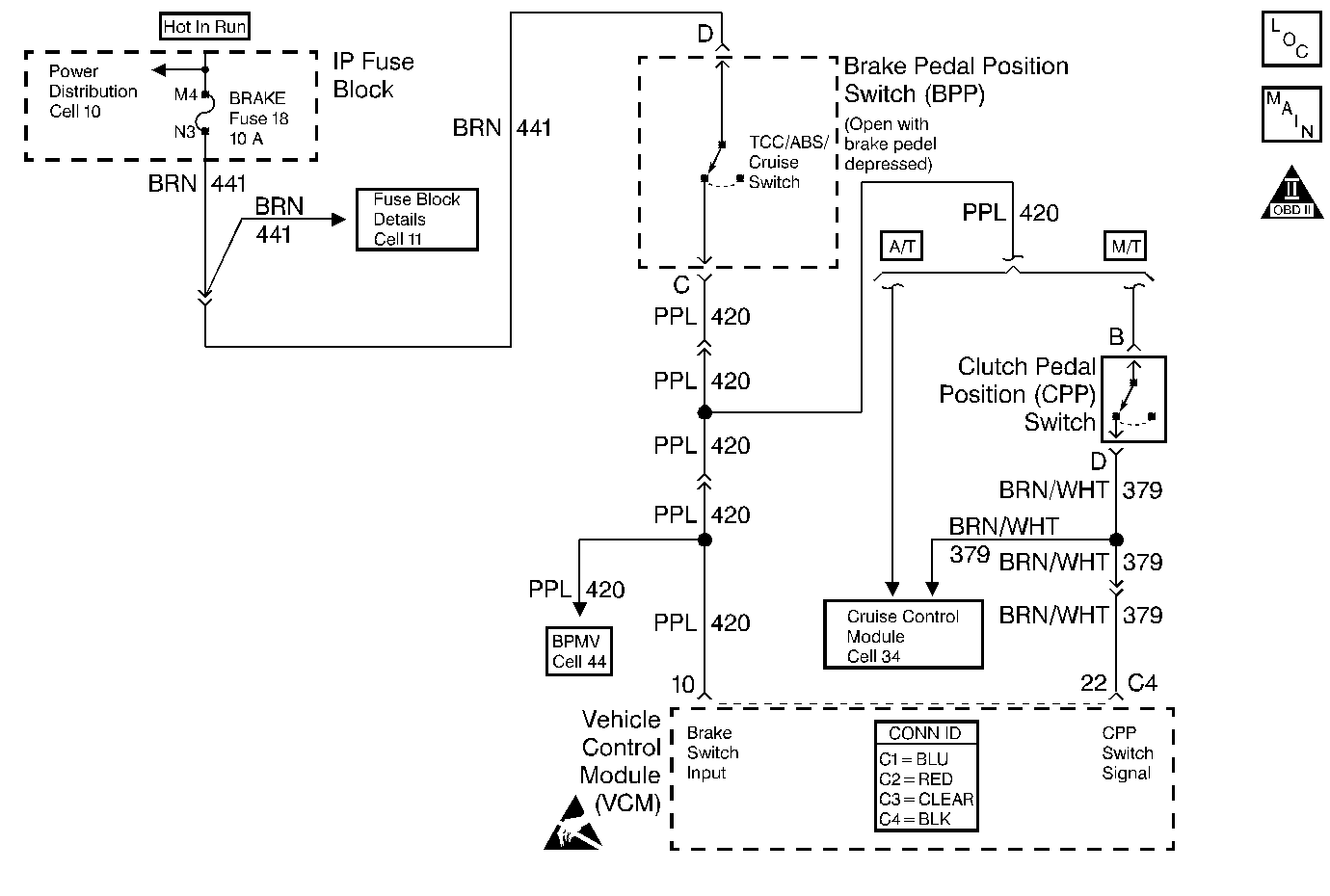
Circuit Description
The clutch pedal position (CPP) Switch is used to determine when the clutch pedal is applied. Ignition voltage is applied to the control module (PCM/VCM) CPP input through the CPP switch. When the clutch pedal is depressed, ignition voltage is removed from this input. The control module monitors the CPP signal for transitions during normal vehicle operations. If the control module detects that no clutch pedal applications have occurred during a predetermined test cycle, a DTC P0704 will be set.
Conditions for Running the DTC
| • | No active VS sensor DTCs |
| • | The vehicle speed is greater than 50 MPH |
Conditions for Setting the DTC
The VCM has not detected any changes in the clutch switch status.
Action Taken When the DTC Sets
The VCM turns the MIL (Malfunction Indicator Lamp) ON after 2 consecutive trips with the fault present.
Conditions for Clearing the MIL or DTC
| • | The control module turns OFF the MIL after 3 consecutive drive trips when the test has run and passed. |
| • | A history DTC will clear if no fault conditions have been detected for 40 warm-up cycles. A warm-up cycle occurs when the coolant temperature has risen 22°C (40°F) from the startup coolant temperature and the engine coolant reaches a temperature that is more than 70°C (158°F) during the same ignition cycle. |
| • | Use a scan tool in order to clear the DTCs. |
Diagnostic Aids
When the clutch pedal is released, the clutch switch will be displayed Released in the scan tool data list.
If the brake pedal is applied with the clutch pedal released, the clutch switch will be displayed Applied in the scan tool data list.
When the clutch pedal is depressed, the clutch switch will be display Applied in the scan tool data list.
A poor connection, a rubbed through wire insulation, or a wire that is broken inside the insulation may cause an intermittent problem.
An intermittent may be caused by any of the following conditions:
| • | A poor connection |
| • | Rubbed through wire insulation |
| • | A broken wire inside the insulation |
Thoroughly check any circuitry that is suspected of causing the intermittent complaint. Refer to Intermittents and Poor Connections Diagnosis in Wiring Systems.
If a repair is necessary, refer to Wiring Repairs or Connector Repairs in Wiring Systems.
Test Description
The numbers below refer to the step numbers on the diagnostic table.
-
This test determines if the VCM is receiving data from the clutch switch.
-
This test determines if the clutch switch is stuck released or applied.
-
This step checks for a short to B+ in the CPP switch input circuit.
Step | Action | Value(s) | Yes | No |
|---|---|---|---|---|
1 |
Important: Before clearing the DTCs, use the scan tool Capture Info to save the Freeze Frame and Failure records for reference. The control module's data is deleted once the Clear Info function is used. Did you perform the Powertrain On-Board Diagnostic System Check? | -- | ||
Does the scan tool clutch parameter change states when the clutch is applied and released? | -- | |||
3 | The DTC is intermittent. Are any additional DTCs stored? | -- | Go to the applicable DTC table | Go to Diagnostic Aids |
Apply the clutch pedal with the Brake Pedal released. Does the scan tool display the clutch switch Applied? | -- | Go to Diagnostic Aids | ||
5 |
| -- | ||
Is the test lamp ON? | -- | |||
7 | Replace the clutch pedal position switch. Is the action complete? | -- | -- | |
8 | Repair the circuit as necessary. Refer to Wiring Repairs in Wiring Systems. Is the action complete? | -- | -- | |
9 |
Refer to Crankshaft Position System Variation Learn . Is the action complete? | -- | -- | |
10 |
Does the scan tool indicate the diagnostic Passed? | -- | ||
11 | Does the scan tool display any additional undiagnosed DTCs? | -- | Go to the applicable DTC table | System OK |
